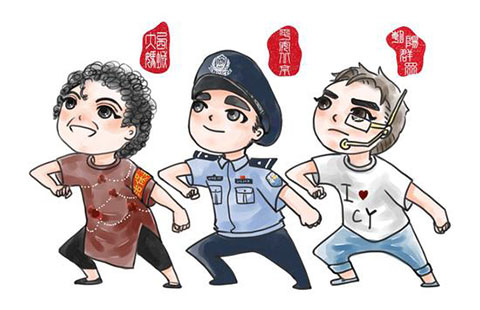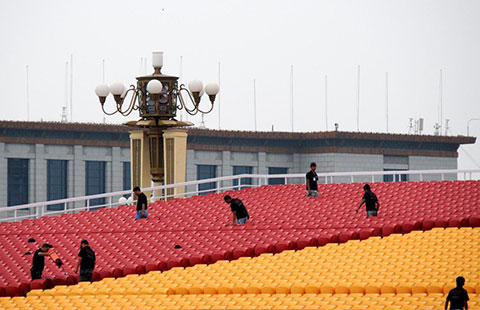China's railway export to Argentina holds wider opportunity
Updated: 2015-08-24 04:49
By Yang Ziman(China Daily Latin America)
|
||||||||
China's export of railway equipment to Argentina will help expand the market in Latin America where aging rail infrastructure is crumbling, said experts.
On July 29, 25 contracted diesel multiple-unit (DMU) cars built in China arrived in Buenos Aires as part of the upgrade of the Belgrano Sur railway.
According to Florencio Randazzo, Argentine interior and transport minister, the first trains will begin to operate on the Belgrano Sur line, which connects the capital with the country's southeast.
CNR Tianjin JL Railway Transport Equipment Co Ltd, a subsidiary of China North Railway, won a bid to replace the trains and the tracks on Argetina's Belgrano Sur railway in November 2013. The project involves 21 lines with 81 DMUs. This is so far China's biggest DMU order in South America.
"China's export of trains to Argentina is because the country is lagging behind in rail infrastructure construction, which has put a strain on the country's economic development," said Xie Wenze, a professor at the Institution of Latin American Studies at the Chinese Academy of Social Sciences. "Argentina’s government has been working on improving infrastructure construction in recent years. Its economy has been slow for quite a few years. It is eager to put a spur on its economy by improving infrastructure construction."
The international market's demand for primary goods has decreased, lowering prices. It is a hard blow to countries, including Argentina, which rely mainly on primary goods exports. Developed countries therefore are reluctant to invest in minerals, agriculture and infrastructure in these countries. However, it is a golden opportunity for China to invest overseas.
According to Xie, developing countries such as Argentina and Brazil, which rely heavily on overseas capital and financing in the international market, find it hard to gain the capital they need for economic growth against the backdrop of the global economic slowdown.
"In the past, we didn't have much access to these markets. But now, we can tighten the ties with them by exporting complete sets of equipment. This is an opportunity that never appeared in the past few decades," said Xie.
Xie said that since many other Latin American countries, such as Uruguay, Chile and Mexico also need to update their crumbling railway systems, China’s train export to Argentina can present a good example of the quality of its railway vehicles and technologies. The follow-up services and technological support will increase as well, bringing opportunities for China to collaborate with local companies in producing train parts.
"In the long run, the collaboration will extend to more sophisticated areas such as the financial industry. Chinese manufacturers may be able to get loans in Argentina, for instance," Xie added.
The investment in infrastructure projects in Latin America keeps Chinese industry busy, according to a report by Stratfor, a Texas-based geopolitical intelligence firm.
According to the report, as China's economy can no longer be sustained by low-end manufacturing exports, the country is seeking to move up the value chain. It has recently accelerated its attempts to export rolling stock, from urban subway and light rail to heavy freight locomotives and high-speed trains.
"As China has increased investment in its domestic rail systems, the country has taken the logical step of funding and encouraging rail projects around the globe, creating a market for its technology and rolling stock. China can sell its rail products abroad and is looking to invest in new production facilities in Latin America to service long-term demand," said the report.
The value of Chinese exports of machinery and transportation equipment is growing rapidly. It hit $1 trillion (119 trillion yuan) for the first time in 2013, which is 11 times higher than that of 2001.
In 2014, exports of railway equipment totaled some $4.36 billion, a 22.6 percent increase from a year earlier.
Private railway companies in Argentina have been criticized for the lack of maintenance that has resulted in frequent accidents. These companies refuted the criticism blaming overtly cheap tickets and low government subsidies.
In 1990s, Argentina launched the privatization of railway. One private company ran one-third of light railways in Buenos Aires.
On February 22, 2012, a derailed metro train in Buenos Aires caused 51 deaths, with more than 600 people injured. On February 27 of the same year, another metro train in Buenos Aires exploded and injured a driver.
Argentina launched the nationalization of its railroads in May, taking over three key lines and canceling without compensation all contracts with the companies involved. The government stated that the private concessions would not be compensated.
Over the last few years, the term "high-speed railway diplomacy" has been catching on in Chinese political spheres. It is used to describe China's initiative of exporting high-speed railway products, projects and technologies. Memorandums and contracts on China's high-speed railway-related exports have been signed during President Xi Jinping and Premier Li Keqiang's state visits overseas.
China imported high-speed railway technologies in 2003. Today the country boasts the greatest length of high-speed railway tracks in the world. More than 10,000 kilometers of the rail are capable of carrying trains at speeds in excess of 200 kilometers per hour.
"China's high-speed rail is now a national strategy. The State Council is lending support to high-speed train equipment manufacturing and the exploration of the overseas market," said an analysis of Shenzhen-based Essence Securities Co Ltd. According to the statistics of the International Union of Railways, more than 30,000 kilometers of high-speed railways are expected to be built in the future around the world.
"China's high-speed train has advantage in cost, operation, speed and technological standards. It can offer a whole set of solution from design, construction, equipment manufacturing to management. It will take up large market share in global high-speed rail construction around the globe," said the Essence Securities’ analysis.
"High speed railway technology can help promote China's international image and soft power. Although China's economy has been a huge success for the last three decades, many in the West still view China mainly as the world's factory with cheap exports like shoes and toys," according to an article in The Diplomat.
"But as China gradually transforms itself into a high tech powerhouse and moves up the economic ladder, it is imperative for China to develop economic sectors that can sustain its growth in the future. And high speed railway can exactly play this role as it involves huge capital, advanced technology, and domestic innovation," said the article.
- Tsipras formally resigns, requesting snap general elections
- China-Russia drill not targeting 3rd party
- UK, France boost security
- China demands Japan face history after Abe's wife visits Yasukuni Shrine
- DPRK deploys more fire units to frontlines with ROK
- DPRK, ROK trade artillery, rocket fire at border

 Giant panda Bao Bao celebrates two-year birthday
Giant panda Bao Bao celebrates two-year birthday
 Across America over the week (Aug 14 - Aug 20)
Across America over the week (Aug 14 - Aug 20)
 Stars in their eyes: leaders in love
Stars in their eyes: leaders in love
 A survival guide for singles on Chinese Valentine’s Day
A survival guide for singles on Chinese Valentine’s Day
 Beijing police publishes cartoon images of residents who tip off police
Beijing police publishes cartoon images of residents who tip off police
 Rare brown panda grows up in NW China
Rare brown panda grows up in NW China
 Putin rides to bottom of Black Sea
Putin rides to bottom of Black Sea
 The changing looks of Beijing before V Day parade
The changing looks of Beijing before V Day parade
Most Viewed
Editor's Picks

|

|

|

|

|

|
Today's Top News
China advocates practical cooperation between LatAm, East Asia
Giant panda gives birth at Washington's National Zoo
Emissions data won't change China policy
Preparations shutter Forbidden City, other major tourist spots
President Xi Jinping calls for crews not to ease up
Chemical plants to be relocated in blast zone
Asian sprinters on track to make some big strides
Jon Bon Jovi sings in Mandarin for Chinese Valentine's Day
US Weekly

|

|






